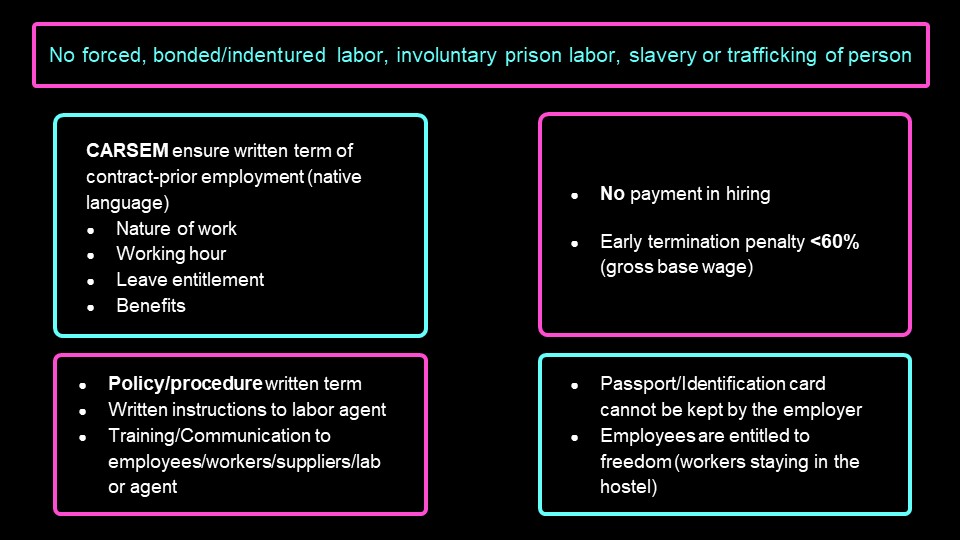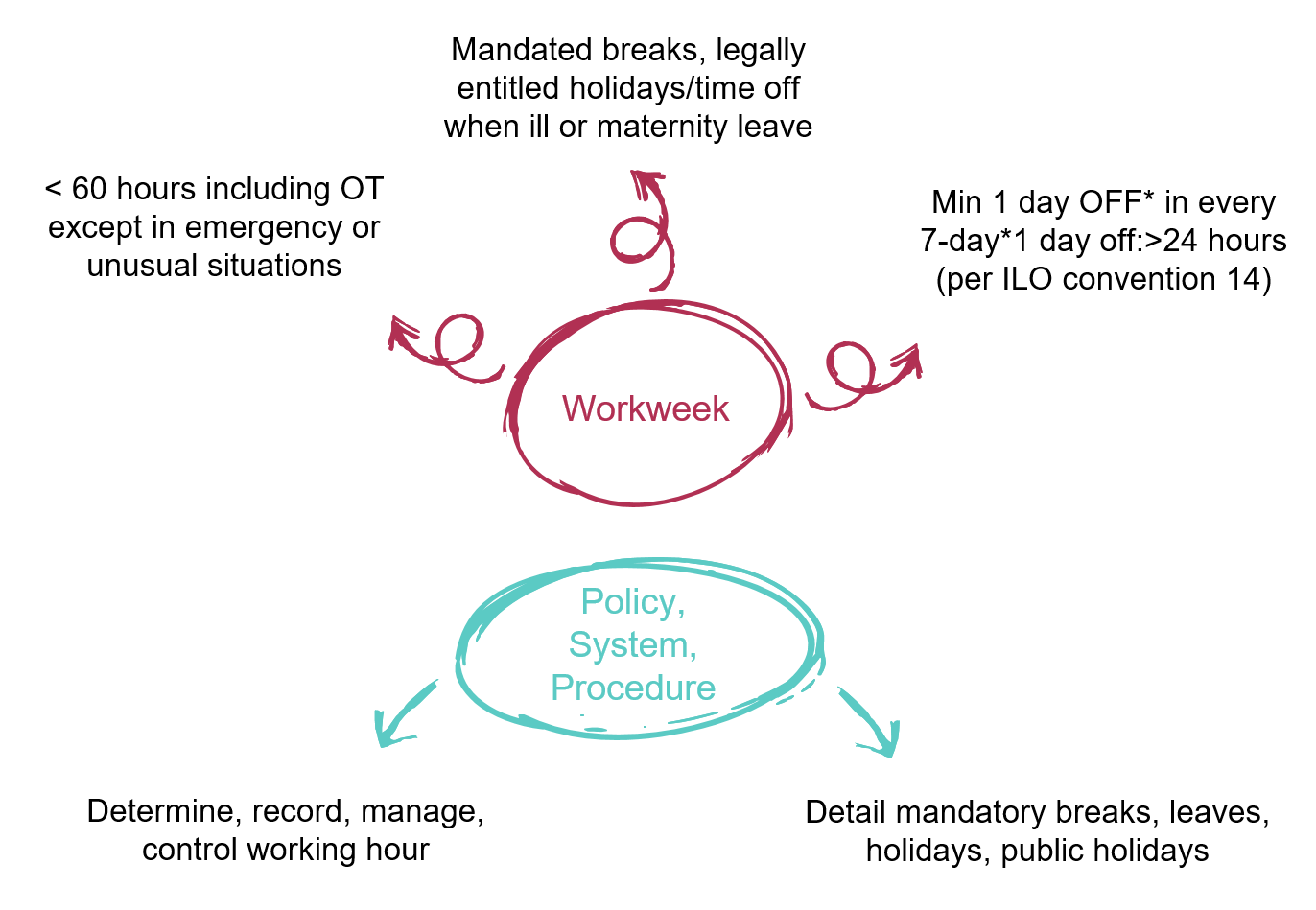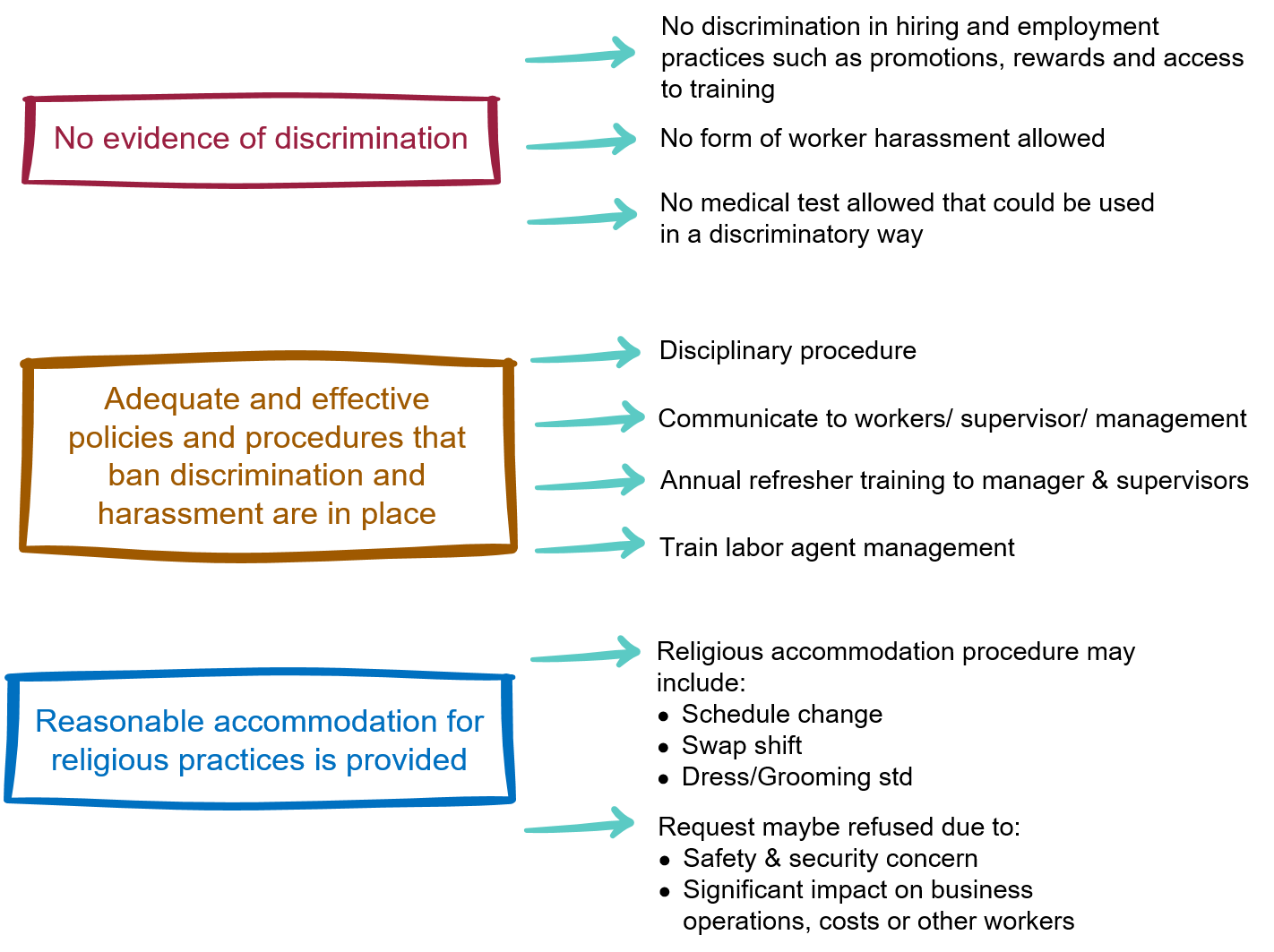We are committed to uphold the human rights of workers, and treat them with dignity and respect as understood by the international community.
This applies to all workers including temporary, migrant, student, contract, direct employees, and any other type of worker.
Elements of labor management, in line with RBA Code of Conduct:
- Freely Chosen Employment
- Child labor and Young Workers
- Working Hours
- Wages and Benefits
- Humane Treatment
- Non-Discrimination
- Freedom of Association
Forced, bonded (including debt bondage) or indentured labor, involuntary prison labor, slavery or trafficking of persons shall not be used.
This includes transporting, harboring, recruiting, transferring or receiving persons by means of threat, force, coercion, abduction or fraud for labor or services. There shall be no unreasonable restrictions on workers’ freedom of movement in the facility in addition to unreasonable restrictions on entering or exiting company-provided facilities. As part of the hiring process, workers must be provided with a written employment agreement in their native language that contains a description of terms and conditions of employment prior to the worker departing from his or her country of origin.
All work must be voluntary and workers shall be free to leave work at any time or terminate their employment. Employers and agents may not hold or otherwise destroy, conceal, confiscate or deny access by employees to their identity or immigration documents, such as government-issued identification, passports or work permits, unless such holdings are required by law. Workers shall not be required to pay employers’ or agents’ recruitment fees or other related fees for their employment. If any such fees are found to have been paid by workers, such fees shall be repaid to the worker.
According to the International Labor Organization (ILO), approximately 152 million children are still in the grips of child labor and are working under conditions that violate their rights and deprive them of their childhood. Although there is progress of 38% reduction in child labor in the last decade, there is much more to be done. Furthermore, 2021 is the international year for the elimination of child labor, and it’s time to accelerate the pace of support and practical actions to eliminate child labor for good.
At MPI, we take an active stand and unconditionally prohibit child labor, in line with our commitment to the RBA Code of Conduct, ILO Declaration on Fundamental Principles and Rights at Work, and the local laws on child labor.
Child labor is not to be used in any stage of manufacturing. The term “child” refers to any person under the age of 15, or under the age for completing compulsory education, or under the minimum age for employment in the country, whichever is greatest. The use of legitimate workplace learning programs, which comply with all laws and regulations, is supported.
Workers under the age of 18 (Young Workers) shall not perform work that is likely to jeopardize the health or safety of young workers, including night shifts and overtime. Participant shall ensure proper management of student workers through proper maintenance of student records, rigorous due diligence of educational partners, and protection of students’ rights in accordance with applicable law and regulations.
Participant shall provide appropriate support and training to all student workers. In the absence of local law, the wage rate for student workers, interns and apprentices shall be at least the same wage rate as other entry-level workers performing equal or similar tasks.
Studies of business practices clearly link worker strain to reduced productivity, increased turnover and increased injury & illness. Workweeks are not to exceed the maximum set by local law. All overtime must be voluntary.
We take steps to ensure that our employees do not perform work exceeding the maximum hours allowed by the local law. Moreover, we take actions to reduce excessive working hours, and support exceeding the minimum wage by allowing our employees to perform overtime. In doing so, we comply with the respective local laws across all our facilities – Malaysian Employment Act 1955, and Labor Law of the People’s Republic of China.
Compensation paid to workers shall comply with all applicable wage laws, including those relating to minimum wages, overtime hours and legally mandated benefits. In compliance with local laws, workers shall be compensated for overtime at pay rates greater than regular hourly rates.
Deductions from wages as a disciplinary measure shall not be permitted. The basic on which workers are being paid is to be provided in a timely manner via pay stub or similar documentation. For each pay period, workers shall be provided with a timely and understandable wage statement that includes sufficient information to verify accurate compensation for work performed. All use of temporary, dispatch and outsourced labor will be within the limits of the local law.
There is to be no harsh and inhumane treatment, including any sexual harassment, sexual abuse, corporal punishment, mental or physical coercion or verbal abuse of workers; nor is there to be the threat of any such treatment. Disciplinary policies and procedures in support of these requirements shall be clearly defined and communicated to workers.

We take steps to ensure a workplace that is free of harassment and unlawful discrimination. We assign central importance to fair working conditions and employee rights, and reject all forms of discrimination based on race, color, age, gender, sexual orientation, gender identity and expression, ethnicity or national origin, disability, pregnancy, religion, political affiliation, union membership, covered veteran status, protected genetic information or marital status in hiring and employment practices such as wages, promotions, rewards, and access to training. It begins by creation and promotion of an inclusive workplace, where all staff can perform at their best while valuing their differences.
Open communication and direct engagement between workers and management are the most effective ways to resolve workplace and compensation issues. The rights of workers to associate freely, join or not join labor unions, seek representation, and join workers’ councils in accordance with local laws shall be respected.
Workers shall be able to openly communicate and share grievances with management regarding working conditions and management practices without fear of reprisal, intimidation or harassment.
Carsem has quarterly “Teh Tarik” Sessions chit chat between labor & the company’s general manager and also Skip Level Meeting with the department manager. We also have biannual Department Communication Sessions, Executive Forums and a quarterly Star Award Programme to appreciate outstanding employees. This is a platform for communication between employees with management.




